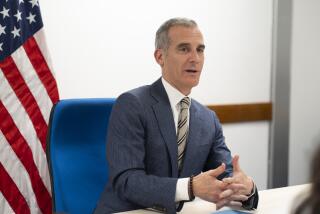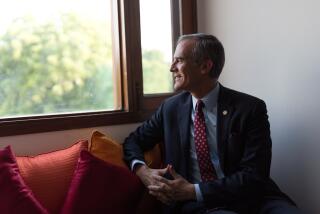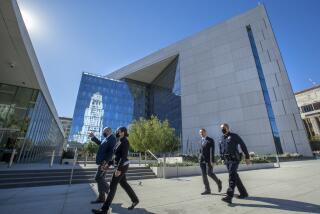Politics in the past, Gil Garcetti keeps an eye on his son’s future
More than a dozen years after being bounced from office by the voters of Los Angeles, Gil Garcetti doesn’t want to forget his time as district attorney so much as he wants to reframe it.
“You can mention that I am a former district attorney somewhere along the line,” Garcetti tells people who introduce him at public events. “But I am a photographer, first and foremost.” With a slight pause, he adds: “The best line, though, is going to be being introduced as the father of the mayor of Los Angeles. That would be pretty cool.”
As he shares the last thought, Garcetti draws in a breath and his eyes well with tears. With his son, City Councilman Eric Garcetti, one of the top contenders for the mayor’s office, it’s tempting to ascribe all sorts of roots for the elder Garcetti’s emotion.
Could it be the feeling of potential vindication after his own blowout loss in 2000 to one of his deputies, Steve Cooley? Maybe it marks anticipation of fulfillment, by proxy, of his own ambition for higher office. But evidence points to something more prosaic — a proud father rooting for his son.
The former pro-”three strikes” career prosecutor has evolved into a death-penalty-fighting artiste who hops the globe with photo exhibitions that promote social causes like clean water for Africans and the advantages of bicycle commuting.
Gil Garcetti’s literal presence in the mayor’s race — rooting for Eric at debates, taking photos, speaking at fundraisers — is not enormous. But it casts a bigger shadow than his figurative presence. His eight years as D.A., which included the loss of the O.J. Simpson murder trial, scarcely get a mention on the campaign trail.
That seems to be the best possible outcome for the younger Garcetti. Eric gets the benefit of the afterglow of a familiar political name, but without being held accountable for a 1992-2000 tenure that got seriously mixed reviews.
“In a race like this, any sort of residual name ID is a good thing,” said political consultant Parke Skelton, who ran Gil Garcetti’s first campaign for district attorney. “I doubt if many voters really remember much specifically about Gil Garcetti. It’s a name they recall. And the longer people are out of office the better people tend to like them.”
That’s always as it has been between the Garcetti father and son — major influences on each other, but not always in the ways that might be suspected.
Gil Garcetti, 71, recalls an episode in 1988, when he was unexpectedly demoted by Dist. Atty. Ira Reiner from his post as No. 2 in the prosecutor’s office. His son, then a freshman at Columbia University, called to offer his dad some advice.
“He said, ‘I would urge you don’t do anything right now. Just let it sink in.’ He said, ‘At some point maybe you will have the opportunity to quote get even.’ But he said that’s not what it’s all about,” Garcetti recalled. “He told me to just understand this is not a reflection on you, it’s all politics.”
Four years later, Garcetti mulled whether to run against his boss, Reiner, for D.A. His wife, Sukey, didn’t much like the idea. His best friend told him to pass. Eric urged him on. The elder Garcetti said that enthusiasm “helped a lot, obviously” in making his decision to run.
When it came the father’s turn to offer advice, he proposed a different path. Eric was wrapping up his academic career — a bachelor and master’s degree at Columbia, followed by a Rhodes Scholarship and study at Oxford. He would earn a master’s degree in international affairs, but he was also an accomplished pianist, who had written musicals with a Columbia friend (Brian Yorkey, who went on to win a Pulitzer Prize and Tony Award for one of his plays.)
Gil Garcetti encouraged his son to take a few years to pursue his music. But Eric had already been on multiple trips overseas and, after Oxford, taught diplomacy and world affairs at USC and Occidental College. In 2000, just as his father was voted out of office, Eric announced that he would run for City Council.
“That surprised me. I said, ‘Eric, understand this cuts both ways for you,’” the elder Garcetti recalled. “ ‘I just got booted out of office. It wasn’t a close election. [Voters] told me to go find something else to do.’”
Eric took his father’s loss hard, but said it did not turn him off. “He inspired me, as my mom inspired me, to pursue public service,” he said.
Gil appears frequently for his son during the campaign. Gone are the natty suits of his lawyering days. They have been replaced by dark sweaters, a scarf tossed jauntily around his neck. The audacious cheekbones remain.
Eric, 41, rarely makes campaign references to his father’s time in office. An exception came last week during a debate in South Los Angeles. Asked about excessive force by police, candidate Garcetti recalled his father discussing his days with the D.A. unit charged with investigating police brutality.
“He would go to the division to tell officers that they would be investigated in these cases,” Garcetti said. “One said ‘You know what, Mr. Garcetti, if you were dying in the street and I saw you, I would step right over you.’”
Today, Gil Garcetti follows his son’s campaign closely, but not obsessively. He might leave for a ski weekend or, as he did earlier this month, attend the opening of an exhibit of his photos at the University of Dundee in Scotland, showing the damage suffered by the people of West Africa because of inadequate water development.
Photography, a pastime since his youth, began to change his life after the loss to Cooley. The former D.A. spent months taking pictures of the ironworkers helping frame Disney Hall on Bunker Hill. One of the laborers encouraged Garcetti to publish a book of the pictures so the workers’ toil would not be forgotten.
The resulting book “Iron: Erecting the Walt Disney Concert Hall” got strong reviews. Garcetti ignored offers from law firms and followed his new passion. Today, his pictures are compiled in seven books — with topics ranging from Cuban dancers, to the women cyclists of Paris, to television’s “The Closer,” the drama on which he also served as a technical consultant.
Pulitzer Prize-winning photographer David Hume Kennerly has become a mentor. He normally disdains such entanglements, Kennerly said, because so many late-in-life amateurs have little talent. But he called Gil Garcetti a “serious photographer” with “a good eye.”
The elder Garcetti’s supporters once talked of him becoming state attorney general, maybe even governor. Now, his thoughts are occupied by his next collection of photos: men 80 and older. The subjects he’s seeking would “have an elegance about them,” he said. “But more a satisfaction in their eyes from the lives they have lived.”
twitter.com/latimesrainey
More to Read
Sign up for Essential California
The most important California stories and recommendations in your inbox every morning.
You may occasionally receive promotional content from the Los Angeles Times.











